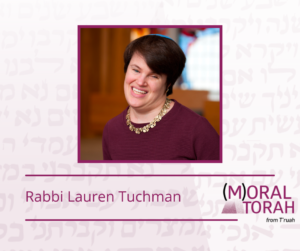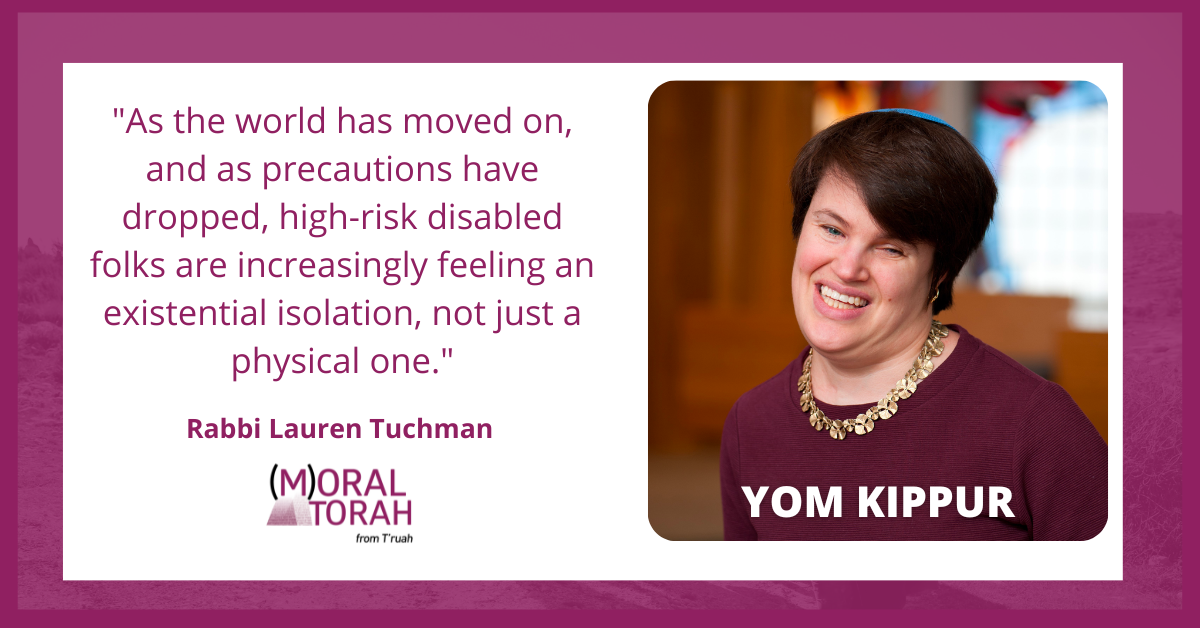A D’var Torah for Yom Kippur by Rabbi Lauren Tuchman
In her hard-hitting piece, You Are Not Entitled to Our Deaths: COVID, Abled Supremacy and Interdependence, noted disability justice activist Mia Mingus describes the visceral experience she and far too many other disabled people have had during the COVID-19 pandemic. It is not merely the isolation and the social distancing, as she argues that both of these are realities for most disabled people at some point in our lives. Rather, it is the existential despair that accompanies the knowing in the deepest part of the soul that your life is an inconvenience at best and doesn’t matter at worst. Citing examples of the ways in which this existential marginalization has made itself known, Mingus wonders if she will ever be able to leave her home again, as she and so many other high-risk disabled folks are wrapped in the “wet tar” of grief that is compounded again and again. It is hard, she writes, knowing that you need folks to behave in COVID-safe ways in order to emerge from the isolation you are in to keep yourself alive as you simultaneously know that they — that we — don’t need you.
I read this piece multiple times, each time feeling the weight of it and of my own reactivity. I felt a welling up of tears — tears of anger, of sorrow, of deep grief — all of those emotions that so many of us have allowed to fester during this difficult time. I also wondered how I, a rabbi — the first blind woman in the world to enter the rabbinate — can respond and live my life with a sense of wholeness and integrity while simultaneously holding the multi-layered reality that is the experience of the COVID pandemic, not least for disabled folks. Across the board, we dealt with and continue to face numerous accessibility barriers. One of these which was particularly stark was the complete lack of accessible COVID tests for those who are blind or low vision.
Sign up to receive (M)oral Torah in your inbox each week.
The mental health impact of the past two and a half years cannot be overstated. Feeling cut off physically from community has left its mark upon all of us. As the barriers to access begin to lessen, at least for some of us, we are sitting with feelings of tremendous excitement and possibility for what our future will hold, when we may not have felt that for years.
As Yom Kippur approaches and we prepare ourselves for the awesome day ahead, many of us feel tremendous hakarat hatov — recognition of the good — knowing that, with God’s help, we are able to gather safely with our spiritual communities. We may find that the individual and communal introspection asked of us by our tradition is overshadowed this year by the sense of relief at the ability to gather.
As I prepare my heart and soul for this awesome and joyous day, I hold also the reality that for many, the ongoing pandemic we are living in feels more isolating than ever. As the world has moved on, and as precautions have dropped, high-risk disabled folks are increasingly feeling an existential isolation, not just a physical one. What does it mean when your community actively chooses to loosen COVID restrictions because the majority of its members either don’t need them, presumably, or because the last two years have been awful, and you just need relief from it all? When you are in the presumed minority of folks who are only able to be in highly COVID-compliant environments, the isolation from spiritual community stings all the more. Do Jewish communities simply not care, many people ask out of deep anguish. Does my life matter to you? Am I remembered for life, not just by The Holy One of Blessing but also by my own flesh and blood community? The mere asking of the question is soul-crushing enough.
As Yom Kippur enters, a hush falls over the sanctuary as the prayer leader begins Kol Nidrei. Before intoning the famous declaration annulling our vows, we affirm as a collective that all are permitted to pray alongside us, no matter who they are or how far they feel from Jewish practice. We create a bet din – a Jewish court – to effectuate this, not merely the bet din shel ma’alah [supernal court] but shel matah [on earth below] as well. Above and below come together to say in the strongest possible terms: You are wanted, you matter, you are part of the people of Israel.
Find more commentaries on Yom Kippur.
We know that the world will never be the same again and that we are not soon to revert back to the way things were in February 2020. COVID is here to stay, unfortunately, and it is upon all of us to cultivate resilience practices to live with this virus. I believe it is highly purposeful that we begin Yom Kippur with an affirmation that the Jewish people is a single unit, all of us together asking for life, for sustenance, to feel like we are able to be better people in the year to come. This year, may Yom Kippur’s opening words not be merely a rote, formulaic ritual. May they call us into deeper, harder conversation and connection. May they allow us to open ourselves to hear the cries of those physically marginalized, spiritually aimless and feeling loneliness so deep we cannot fathom it.  May we revel in the joy that others hold as they begin to feel, even faintly, possibilities for a future opening up. May neither cancel out the other.
May we revel in the joy that others hold as they begin to feel, even faintly, possibilities for a future opening up. May neither cancel out the other.
May we never stop striving to make our communities holy for those with and without, communities that remember all of us for life.
For more resources, check out the newly-launched Jewish Covid Resilience Network.
Rabbi Lauren Tuchman is a sought after speaker, spiritual leader and educator. Ordained by The Jewish Theological Seminary in 2018, she is, as far as she is aware, the first blind woman in the world to enter the rabbinate. She was named to the New York Jewish Week’s “36 Under 36” for her innovative leadership concerning inclusion of Jews with disabilities in all aspects of Jewish life.

